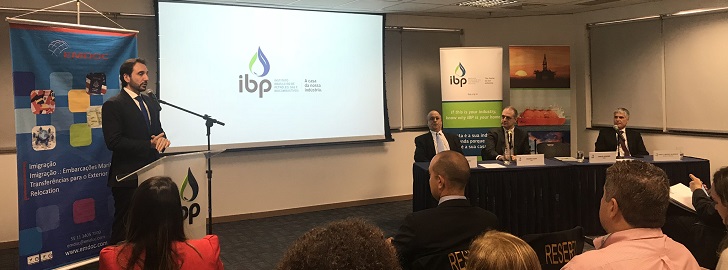IBP, EMDOC, Brazil-Germany Chamber of Commerce and UN Global Compact releases Guide to Good Practices of the New Migration Law

To discuss new opportunities prompt by the new Migration Law and the corporate risks, the Brazilian Petroleum, Gas and Biofuels Institute (IBP) in partnership with EMDOC, the Brazilian UN Global Compact Network and the Brazil-Germany Chamber of Commerce, hosted the release of the Guide to Good Practices on June 28, at the IBP headquarters. The event gathered IBP associated members as well as institutional partners guests.
The initiative aims to address the benefits and the changes in Brazilian migration law (Lei nº 13.445/2017), published on May 2017, that represents the application of Constitutional principles to immigrants, highlighting the humanitarian and acceptance issues, pointing out important topics and the corporate risks to energy industry representatives in Brazil.
“The new Brazilian Migration Law brings a balanced view of the rights and duties of immigrants and the role of the State as regulator and guardian of national laws. What stands out is the special treatment afforded to scientific, technological and technical support activities, recognized as beneficial to society. This rule is born with the power to promote a leap forward to the benefit of all parties involved”, declares Pedro Alem, IBP Industry Policy Executive Manager.
This law reinforces the Brazilian commitment with the UN Global Compact, a volunteer initiative that acts in partnership with the United Nations Development Programme (UNDP), with the mission to engage the corporate community in promoting an inclusive and sustainable global economy. The engagement actions are founded on the adoption of the Ten Principles universally accepted in the areas of human rights, labor, environment, and anti-corruption.
“The Brazilian Global Compact Network has been supporting signatory companies to meeting the requirements of the law and fight corruption. With the growing migratory flow, we need to ensure proper work conditions to immigrants in Brazil. We believe that a righteous stance of the companies is fundamental to adopt an ethical standard that provides sustainability and credibility to our business in our country”, added Carlo Pereira, Brazilian Global Compact Network Executive Secretary.
The guide has the purpose of fostering the reflection upon usual practices that indicate acts of corruption and are against the ethical values within immigration, drawing attention to the importance of compliance and the adoption of efficient practices against corruption by companies. It comes to supplement actions already practiced by the Global Compact Network with the Guide to Good Practices in Anti-corruption Compliance in the International Labor Market, released last year.
“Our intention with this guide is to promote ethical thinking, by warning companies, foreigners, and all interested persons about not accepting illegal practices, for acts displaying corrupt behavior. The new legislation is an evolution to the country and arrives in a moment where is even more necessary to debate compliance practices and anti-corruption inside companies”, said João Marques, President of EMDOC.